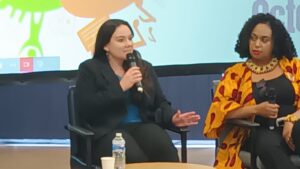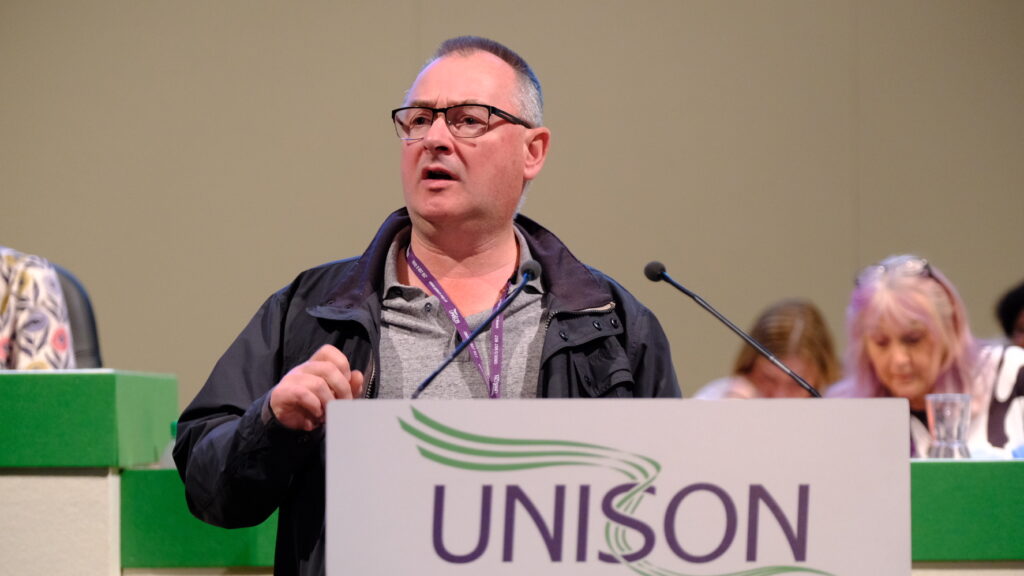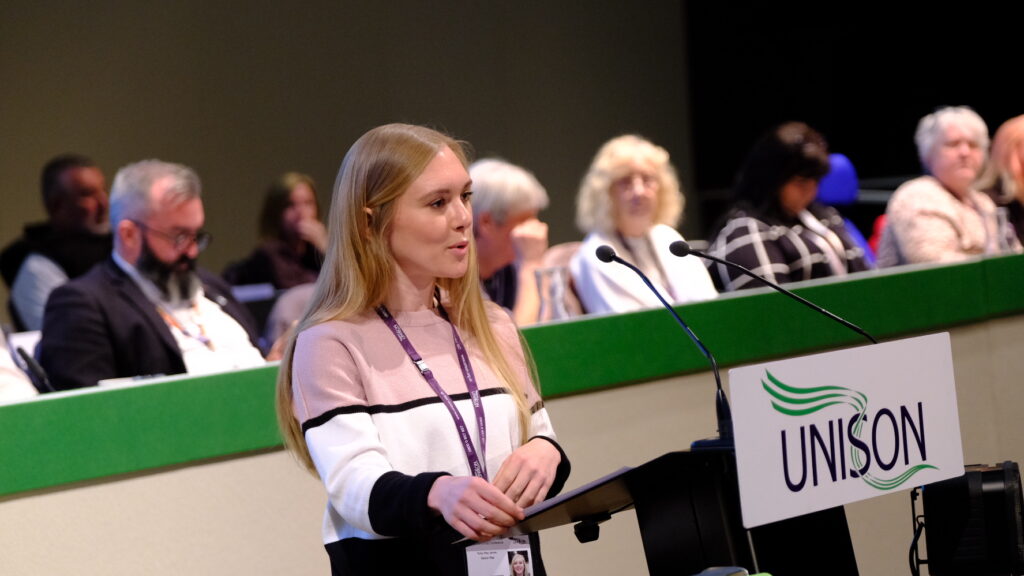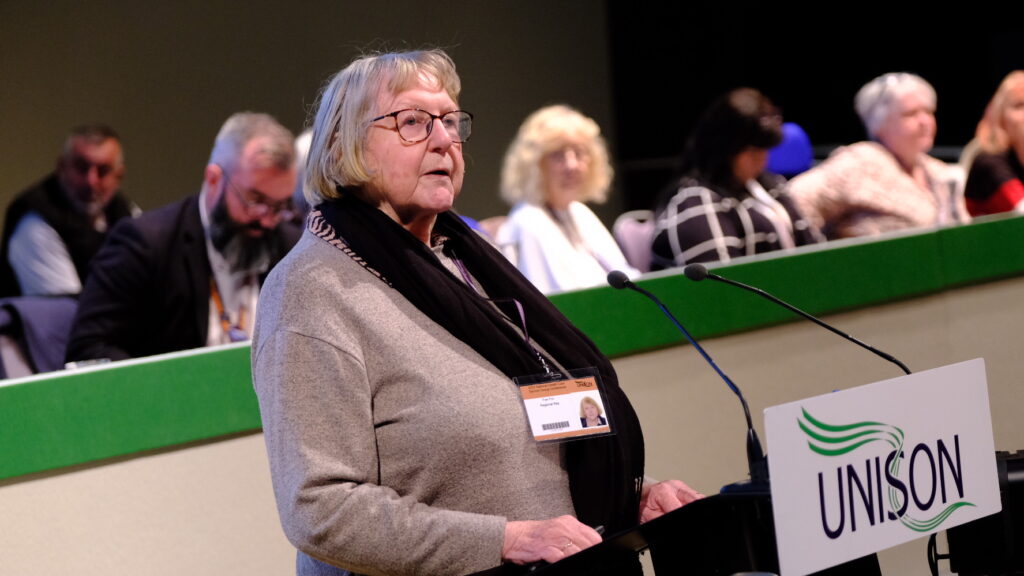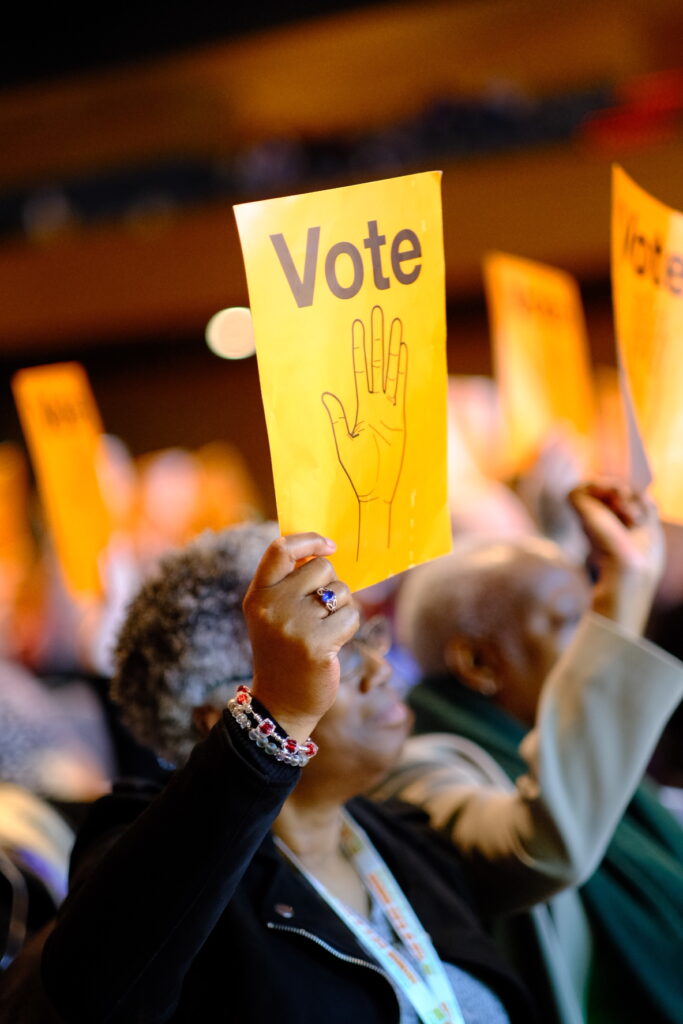Photos: Jess Hurd
UNISON’s general secretary Christina McAnea, gave the keynote address to UNISON’s annual health conference this afternoon (Monday) in Bournemouth and thanked the lay leadership, staff and each and every health activist for their work during a “tough year” for the NHS.
Throughout that year, the health service has faced “the longest waiting times on record, highest levels of dissatisfaction, highest levels of staff vacancies.”
But Ms McAnea argued it was a testament to the work of UNISON’s members, activists and staff, that when public and media attention turned to the NHS strikes in England, “they laid the blame squarely where it needed to be – with the government in Westminster.”
NHS pay disputes
She went on to praise the work done in Scotland in their dispute: “The threats of industrial action and weeks of pay negotiations – led by our very own Wilma Brown – resulting in a deal that delivered pay increases of between £3,700 and £6,500.”
She also highlighted the work of UNISON Northern Ireland, saying: “What a campaign! No government to speak to – employers who can’t take decisions – and yet you still managed to get huge support and you forced the secretary of state to meet with you and, now, you have talks on pay.
“You have shown the power of UNISON. The power of a one team approach. The power of solidarity and collective action.”
Moving back to the NHS dispute in England, Ms McAnea said “We warned the government – back in July and August, that £1,400 was not enough, and that a dispute was inevitable.
“But still, the Tories in Westminster refused to talk to us. They refused to get a grip on the crisis in the NHS, and the pay crisis affecting families across the UK.
NHS strikes in England
“And so, the strikes began in December and we started with strike mandates in eight employers. Of course, we would have liked many more to get over the 50% ballot threshold.
“But with so many branches getting over 40%, it was clear how much work had gone in.
“And I say to anyone who can’t bring themselves to be positive about our union’s work – don’t talk down our efforts. Look at what those eight branches achieved. The publicity – the media coverage – the public support.”
She said it was a “huge privilege” to meet amazing activists from “Sheffield to Soundwell and Waterloo to Windy Nook.” Adding that her job “was made easier because I was able to see first-hand both your commitment to your job and your determination to see this fight through.”
She told delegates it was no coincidence that, a few days after UNISON received a strike mandate from a further 10 out of 11 re-balloted employers, the Westminster government “finally said they would talk to us and critically, put significantly more money on offer.
“We were prepared to bring out almost the entire ambulance service in England, Wales and Northern Ireland. Bringing out blood and transplant and specialist hospitals would have been another serious blow to the government. It showed the strength of feeling.”
The improved NHS pay offer
Speaking of the improved offer which came out of the negotiations, Christina said: “Is it the best deal ever – of course not. Do you deserve more, yes you do. But this deal will put money in people’s pay packets. And members have voted decisively to accept it.”
Responding to the idea that 53% turnout isn’t high enough for a strong mandate Ms McAnea said: “If we’d got that in an industrial action ballot – we wouldn’t hesitate to bring people out on strike.”
To the idea that UNISON members accepted the offer only because they’re predominantly low-paid, she said: “Many of our members may be low paid – but that doesn’t mean they don’t understand, or didn’t know what this offer meant.
“Don’t let anyone patronise our members. We gave them the full information. We didn’t hide anything. We didn’t sugarcoat it. And members made up their own mind.”
She continued: “I appreciate each union will do the best they can for their own members. But we also believe in solidarity. We could have done a side-deal and had separate talks. But we didn’t, because we believe in collective action.
“More than that. The reason we need to do right by every part of the workforce in the NHS is because patients need every part of it to be working. If it takes a village to raise a child. It takes a whole team to care for a patient.”
Other avenues to better pay
Moving on from the NHS pay dispute Ms McAnea noted that strikes are only one way to get better pay. “We’ve also had the brilliant earnings max campaign. You’ve put £150 million into people’s pay packets in back pay. We have over 59 live pay fair campaigns across all regions – and over the next year these campaigns will be expanding.”
She closed her speech by saying: “I love coming to this conference. What you do matters to everyone in this country and what you do matters in our union. You are at the centre of the big political debate in our country right now.
“So, make sure you are at the heart and centre of what our great union does next.”
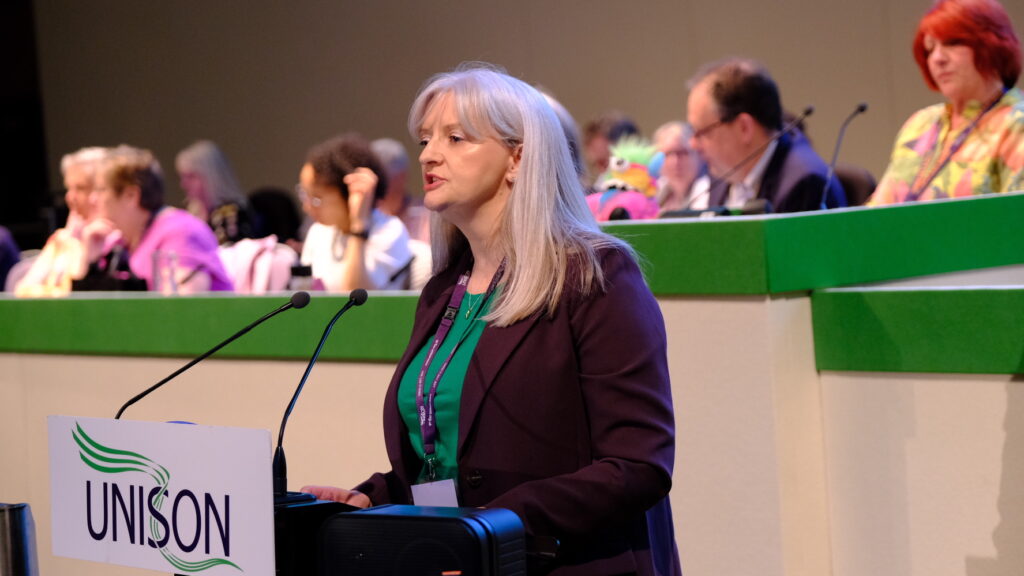
Photo: Jess Hurd
Earlier in the day, conference had been opened by Wilma Brown, chair of the health service group executive.
Ms Brown opened by noting that: “This year our annual get-together feels extremely well-timed.” Adding, “It’s been a long time since delegates were able to debate an actual pay rise at conference.
“Whatever you think of the offer, there is no denying the impressive levels of engagement that have been achieved by the union. And it is testament to the huge amounts of work that branches, regions and the centre put into this.
“This level of participation did not happen by accident; it is the culmination of months of work. Huge thanks to all those who have played a part in this massive effort.”
Referencing reports that the government is considering the possibility of a nurse only pay spine she said: “Conference, I am a nurse – and I’m proud of it. But let me tell you now, I want nothing to do with this divisive nonsense!”
“In UNISON we value the role played by everyone in the NHS team. This is where we as a union derive our strength – and it is what makes the NHS tick. So, I hope we will send out a strong and united message in the coming days that the NHS cannot be picked apart in this way.
“We are ‘One Team’ and that is how it must stay.”
Moving onto issues of devolution, she highlighted that even with different approaches from governments in each of the four nations they remain reliant on Westminster for the size of the spending envelopes they have at their disposal.
She said: “It is essential we maintain our ability to leverage the power of the whole union when we are pursuing campaigns in each of the four nations. This week we must ensure that we make clear to governments across the UK that no UNISON members should ever be left behind – when it comes to pay, or anything else.”
The article ‘This deal puts money in members pay packets – and they voted decisively to accept it’ first appeared on the UNISON National site.
